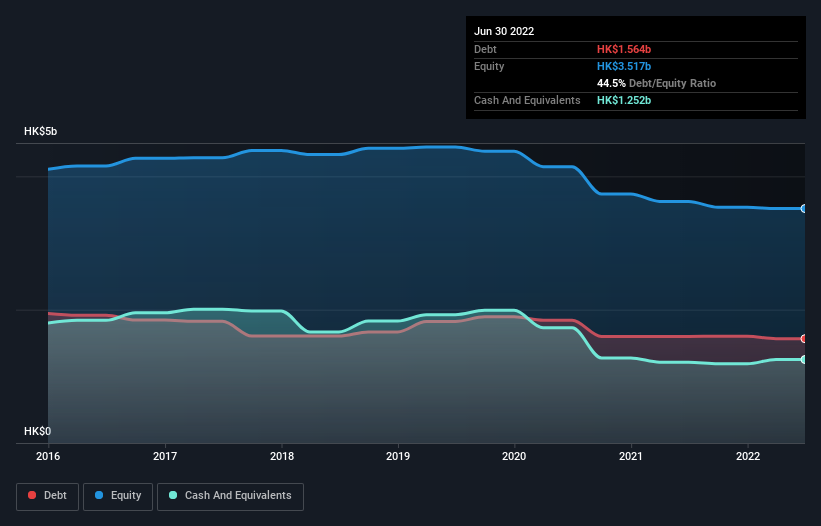- Hong Kong
- /
- Hospitality
- /
- SEHK:184
Is Keck Seng Investments (Hong Kong) (HKG:184) Weighed On By Its Debt Load?
Warren Buffett famously said, 'Volatility is far from synonymous with risk.' It's only natural to consider a company's balance sheet when you examine how risky it is, since debt is often involved when a business collapses. We note that Keck Seng Investments (Hong Kong) Limited (HKG:184) does have debt on its balance sheet. But the real question is whether this debt is making the company risky.
When Is Debt Dangerous?
Debt is a tool to help businesses grow, but if a business is incapable of paying off its lenders, then it exists at their mercy. In the worst case scenario, a company can go bankrupt if it cannot pay its creditors. However, a more common (but still painful) scenario is that it has to raise new equity capital at a low price, thus permanently diluting shareholders. Having said that, the most common situation is where a company manages its debt reasonably well - and to its own advantage. When we examine debt levels, we first consider both cash and debt levels, together.
View our latest analysis for Keck Seng Investments (Hong Kong)
What Is Keck Seng Investments (Hong Kong)'s Debt?
As you can see below, Keck Seng Investments (Hong Kong) had HK$1.56b of debt, at June 2022, which is about the same as the year before. You can click the chart for greater detail. However, because it has a cash reserve of HK$1.25b, its net debt is less, at about HK$312.0m.

How Strong Is Keck Seng Investments (Hong Kong)'s Balance Sheet?
Zooming in on the latest balance sheet data, we can see that Keck Seng Investments (Hong Kong) had liabilities of HK$771.0m due within 12 months and liabilities of HK$1.29b due beyond that. On the other hand, it had cash of HK$1.25b and HK$91.5m worth of receivables due within a year. So its liabilities total HK$721.7m more than the combination of its cash and short-term receivables.
This is a mountain of leverage relative to its market capitalization of HK$782.5m. Should its lenders demand that it shore up the balance sheet, shareholders would likely face severe dilution. The balance sheet is clearly the area to focus on when you are analysing debt. But it is Keck Seng Investments (Hong Kong)'s earnings that will influence how the balance sheet holds up in the future. So when considering debt, it's definitely worth looking at the earnings trend. Click here for an interactive snapshot.
In the last year Keck Seng Investments (Hong Kong) wasn't profitable at an EBIT level, but managed to grow its revenue by 76%, to HK$834m. With any luck the company will be able to grow its way to profitability.
Caveat Emptor
While we can certainly appreciate Keck Seng Investments (Hong Kong)'s revenue growth, its earnings before interest and tax (EBIT) loss is not ideal. To be specific the EBIT loss came in at HK$70m. Considering that alongside the liabilities mentioned above does not give us much confidence that company should be using so much debt. So we think its balance sheet is a little strained, though not beyond repair. For example, we would not want to see a repeat of last year's loss of HK$83m. So in short it's a really risky stock. When analysing debt levels, the balance sheet is the obvious place to start. But ultimately, every company can contain risks that exist outside of the balance sheet. These risks can be hard to spot. Every company has them, and we've spotted 1 warning sign for Keck Seng Investments (Hong Kong) you should know about.
If you're interested in investing in businesses that can grow profits without the burden of debt, then check out this free list of growing businesses that have net cash on the balance sheet.
Valuation is complex, but we're here to simplify it.
Discover if Keck Seng Investments (Hong Kong) might be undervalued or overvalued with our detailed analysis, featuring fair value estimates, potential risks, dividends, insider trades, and its financial condition.
Access Free AnalysisHave feedback on this article? Concerned about the content? Get in touch with us directly. Alternatively, email editorial-team (at) simplywallst.com.
This article by Simply Wall St is general in nature. We provide commentary based on historical data and analyst forecasts only using an unbiased methodology and our articles are not intended to be financial advice. It does not constitute a recommendation to buy or sell any stock, and does not take account of your objectives, or your financial situation. We aim to bring you long-term focused analysis driven by fundamental data. Note that our analysis may not factor in the latest price-sensitive company announcements or qualitative material. Simply Wall St has no position in any stocks mentioned.
About SEHK:184
Keck Seng Investments (Hong Kong)
An investment holding company, engages in hotel and club operations, and property investment and development activities in Macau, Vietnam, the People's Republic of China, Japan, Canada, the United States, and Hong Kong.
Flawless balance sheet and good value.
Similar Companies
Market Insights
Weekly Picks


Crazy Undervalued 42 Baggers Silver Play (Active & Running Mine)


Fiducian: Compliance Clouds or Value Opportunity?

Willamette Valley Vineyards (WVVI): Not-So-Great Value
Recently Updated Narratives


Positioned globally, partnered locally


When will fraudsters be investigated in depth. Fraud was ongoing in France too.


Staggered by dilution; positions for growth
Popular Narratives


MicroVision will explode future revenue by 380.37% with a vision towards success


NVDA: Expanding AI Demand Will Drive Major Data Center Investments Through 2026





